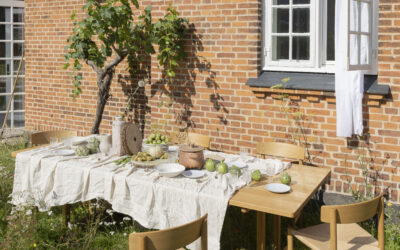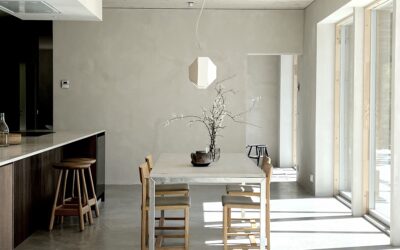Become an Architects’ go-to brand: how to target your brand content toward Architects & Interior Designers
Content is essential in the workflow of architects, and to be the one brand that stands out of the crowd when architects are researching, you need to get your content out there. Architects are busy, so presenting your content in a beautiful digital showroom or through an inspiring send-out is key to reaching them. We sat down with Birgit Tarp, Interior Designer and owner of Design Circus, and Marianne Færch, Architect & Senior Project Manager at Signal, to give insider input on how to promote your brand and become the first choice of architects.
Meet Birgit & Marianne
 Birgit Tarp, Interior Designer
Birgit Tarp, Interior Designer
Design Circus is a Danish interior design studio established in 2004 by Birgit Tarp, who is a wide-ranging textile and interior designer, freelance writer, and expert at the Danish magazine Bo Bedre, concept developer, and inspirational lecturer. At her studio, interior design projects are presented for both businesses and private projects. The eternal goal is to match both people and architecture in a modern and unique way. Read more here.
Marianne Færch, Architect
Marianne is a Senior Project Manager and Architect at Signal and has 10+ years of workplace design experience. Marianne has led various Danish and international headquarter projects in the process from strategy to design implementation. Interdisciplinary collaboration gives the best project output and customer satisfaction. Input from suppliers and available content brings great value to our work and can support our dialogue with customers along the design process until a possible furniture order. Read more here.
How image banks and digital showrooms play a crucial part in the workflow of architects and interior designers
Good content is key. And what better place to find good and accessible content than in digital showrooms? The workflow of interior designers and architects is busy, and any time they can save, they will. If your brand content is too complicated to find, or not specific enough, the architects simply won’t use it. Architects are spending a lot of their time researching content and products already, so if you want to be a considered brand, do your preparations and make the content search as easy as possible for the architects.
“We use image banks and digital showrooms from interior design suppliers to a particularly high degree. Every season we download all relevant documents, such as catalogs and price lists” – Birgit Tarp.
The workflow of an architectural project, and where you need to be present as a brand
To give you a better understanding of the actual workflow on an architectural project, we have outlined it for you in three simple steps;
As Marianne tells us, architects work with content from suppliers throughout all phases from concept to implementation. Visual imagery, drawings, collages, and reference pictures help us set the tone and easily engage with the clients to ensure that we are true to their brand and aspirations. Easy access and configurable content saves time and supports their work in giving clients the best understanding of our design.
“We use both lifestyle images for the look and feel mood boards – and individual specific furniture pieces for presentations.” – Marianne Færch
She explains how cut out packshots allows her to show pieces in different design contents in quick design sprints with the client. During the detailed design phase, architects need access to 2D + 3D files to implement in their drawings.
Digital showrooms can ease the workflow of architects: What content do architects want? And where do they find it?
The architects want the facts, and they preferably want all of them at the same time. To architects, imagery specifications are their way of segmenting if a product is within the budget, lives up to the requested features and at the same time follows the aesthetic of the project. In this way, content is a very practical and necessary tool for architects and a key element of their work process. At the same time content is also an inspiration to the architects. When asked where they go to find content besides image banks and digital showrooms, Pinterest is the number one answer, followed by magazines, Instagram, and fairs.
“I like user-friendly content that gives me a quick overview of color scheme, measurements, prices, and product availability” – Birgit Tarp
Pinterest is an important platform to make sure your content is available on as well. This is a way for your brand to be found by architects that maybe aren’t already familiar with your brand, in a setting where you are showcased in the exact aesthetic they are researching at that point. You can read more about Pinterest, and the importance of pinfluencers right here.
“Furniture producers that have configurators that allow us to change colors and show the furniture without backgrounds are very useful and make it easier for us to show exactly how a specific piece of furniture will look” – Marianne Færch
What makes a brand stand out of the crowd?
Of course, all architects have different parameters on which they evaluate what makes a brand stand out from the crowd. Birgit and Marianne have given us their first-hand thoughts on what makes a brand stand out;
Birgit tells us the brands with an interesting product line or collection that differs from other brands, a strong visual DNA, sustainable production, and aesthetically beautiful products with attractive function or comfort. Marianne says that she seeks inspiration from brands showing an understanding of global work trends, like hybrid working, and collaboration. It can be solutions for the home office or a new type of product for the digital office. In addition, she explains that she always looks for brands with products that stand out which enables her to make solutions that leave an impression. Sustainability is also a key consideration for us when choosing furniture.
Why it is important to make your brand visible among architects?
Architects have a huge industrial impact, being the ones picking and choosing what brands are showcased where and in what setting. They are determining what aesthetic your brand is being contextualized with, having a great impact on how people are pursuing your brand.
A great architectural project is resulting in a beautiful setting, full of beautiful furniture and accessories. And in these times, we know that a good setting and aesthetic surroundings calls for an Instagram post. Providing good content can in that way result in gaining new content back.
“Architects and Designers are visual people that use images as their primary form of inspiration & communication, and it is therefore crucial for manufactures to provide inspiring and emotive imagery that can help us bring our clients along on the journey.” – Marianne Færch
The architects are able to, directly and indirectly, impact your brand, and if an architect loves your content, loves your level of providing detail, and can find exactly what content they are looking for – they are probably gonna use you again on their next project.
Top tips on what content to include in your image bank
Birgit tells us that, to her, it is crucial that newsletters and press images are highly inspiring in all dimensions – unique products, color specifications, recycle-friendly, etc. Images are the most appetizing way of looking and feeling. She says messages should be idea-enriching and at the same time forward all the necessary and essential details on the products. The process handling is short between interior design development and the final decision on products, so the process gets easier with a unique product level.
SIGN UP TO OUR NEWSLETTER
Get free knowledge on how to optimize your B2B marketing & new product releases.
RELATED POSTS
The Art of Slow Living: When Thoughtful Choices Redefine Design
With a fast-paced everyday life, the principles of slow living stand in a sharp and perhaps comforting contrast. As the movement progresses, more people are integrating the values of slow living into all areas of their lives – from slow food to slow fashion and slow...
Mastering Sustainable Branding in Interior Design
In recent years, the appeal of trendy marble coffee tables, plush sofas, and finely designed lamps has captivated us all. While the interior design industry often embodies craftsmanship, it also has a less glamorous side: its environmental impact. This reality has...
Beyond the Aesthetic: The Emergence of Stylists as Influencers
In the realm of interior design, stylists, recognized for turning creative visions into captivating editorial and commercial projects, are increasingly emerging as key influencers on social media. The rise of digital platforms has substantially redefined their roles,...





